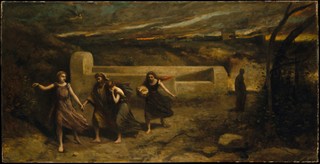Jonah and the Whale - Bible Story Meaning
Share

The story of Jonah and the Whale, as it is often called, is one of the most famous stories from the Bible. While many understandably remember the story for Jonah’s fantastical adventures in the belly of the great sea beast, the book of Jonah in the Old Testament offers incredible insight into the heart and character of God while foreshadowing the gospel of Jesus Christ and God’s ultimate desire for all to repent and come to salvation.
What Happened in the Story of Jonah and the Whale?
The story of Jonah is found in the book of Jonah in the Old Testament. In it, the God of Israel calls one of His prophets, Jonah, to deliver a message of repentance to the people of Nineveh. “Arise, Go to the great city of Nineveh,” God told Jonah, “and preach against it, because its wickedness has come up before me.” (Jonah 1:1)
The assignment was straightforward and the message clear. Jonah, however, had other plans.
Instead of traveling northeast to Nineveh as commanded, the Bible tells us that Jonah went to the port city of Joppa and boarded a ship for Tarshish in a futile attempt to run from God and avoid having to go anywhere near Nineveh (Jonah 1:3).
God, however, was not about to let Jonah off the hook that easily. In the Bible we read that God summoned a great wind and storm to stir up the sea, tossing Jonah’s boat back and forth on the waves.
Facing certain death, the sailors began throwing cargo overboard to lighten the ship, each crying out to his god for salvation. No prayers or even a bigger boat, however, would save them from the consequences of Jonah’s disobedience. To add insult to injury, in their moment of peril, Jonah was sound asleep below decks.
When called upon to pray to his God, Jonah quickly realized that he alone was the cause of the storm (Jonah 1:9). “This terrified them and they asked, ‘What have you done?’ (They knew he was running away from the Lord, because he had already told them so.)” (Jonah 1:10)
Jonah then instructed the sailors to throw him into the sea. “It will become calm,” he said. “I know that it is my fault that this great storm has come upon you.” (Jonah 1:12)
The sailors eventually complied, throwing Jonah overboard, and as promised, the sea became calm. The sailors escaped calamity (Jonah 1:15-16). However, all was not well between Jonah and God.
In this moment, “the Lord provided a huge fish to swallow Jonah, and Jonah was in the belly of the fish three days and three nights.” (Jonah 1:17)

Apparently, the digestive juices of the prophet’s host were enough to soften Jonah’s heart. In the belly of the fish, Jonah prayed to God, repenting of his previous sin, and promising, “what I have vowed I will make good. I will say, ‘Salvation comes from the Lord.’” (Jonah 2:9)
In the words of the popular Veggietales song, Jonah:
“woke up this morning kinda blue
Thinking through that age-old question
How to exit a whale's digestion?”
The Bible then tells us that, “The Lord commanded the fish, and it vomited Jonah onto dry land.” (Jonah 2:10)
This time, Jonah would heed God’s command and travel to Nineveh, preaching and calling the people to repentance as instructed (Jonah 3:1-4). “Yet forty days and Nineveh will be overthrown,” Jonah proclaimed (Jonah 3:4).
But to Jonah’s shock (and disappointment), the Ninevites actually heeded the fish man’s warning, believed in God, and turned from their wickedness (Jonah 3:5) Furthermore, “when God saw what they did and how they turned from their evil ways, he relented and did not bring on them the destruction he had threatened.” (Jonah 3:10)
The story of Jonah then ends with an angry and disappointed Jonah, sitting on a hill overlooking Nineveh, waiting to see what will happen (Jonah 4).
It is one of the most iconic and beloved stories in all of Scripture. However, the story of Jonah and the Whale is more than just a Jewish fable or colorful fish tale. A closer look at the biblical account of Jonah may offer some insight into this story’s true meaning and significance.
Who Was Jonah in the Bible?
Jonah is an interesting figure in the pages of Scripture. Unlike other prophetic books, the book of Jonah, believed to have been authored by the prophet himself, places more emphasis on the messenger than the actual message. What we find, however, is a far less heroic figure than a flawed individual motivated by pride, pettiness, and a lack of compassion for those God wished to save.
However, Jonah was not always a reluctant spokesman for God.
We learn in the book of 2 Kings that Jonah, son of Amittai, was a native of Gath Hepher, a Galilean town in the northern kingdom of Israel. In fact, Jonah was the same prophet who predicted the expansion of Israel’s territory during the reign of Jeroboam II (2 Kings 14:25). Accordingly, Jonah would have ministered to the northern tribes of Israel just prior to the prophet Amos in the first half of the 8th century B.C.
In this sense, the Pharisees of Jesus’ day were wrong when they said, “No prophet has arisen out of Galilee.” (John 7:52)
In Jonah’s day, however, the northern kingdom of Israel, which had broken off from its southern neighbors in 931 B.C., was enjoying a period of relative peace and prosperity. Nationalistic fervor was high, and both Syria and Assyria to the east were weak, allowing Israel to enlarge its northern borders to where they had been during the days of King David and Solomon (1 Kings 17:8-24).
In its prosperity, however, Israel had also become spiritually and morally impoverished. This was a nation that needed a divine wakeup call and a true prophet of God to deliver such a message. For a time, Jonah would fulfill this role. However, Jonah is more famous today for his mission to Nineveh, a Gentile nation, than his ministry to his own people. In fact, Jonah is one of the only Old Testament prophets who was sent directly to the Gentiles.
Where other prophets such as Obadiah, Habakkuk, and Nahum focused on God’s judgment of Israel's enemies, Jonah delivered a message of repentance and ultimately salvation to one of Israel’s greatest adversaries, the mighty Assyrian Empire.
As we read in the book of Jonah, however, the prophet was reluctant to deliver such a message. In fact, he initially refused to go to Nineveh altogether.
What Made Nineveh so Evil?
Nevertheless, around 760 B.C., God called Jonah to Nineveh to call the people of Assyria to repentance.
At the time, Nineveh was the capitol of the Assyrian Empire and one of the largest cities in the ancient world, so large, in fact, it would take three days for someone to walk from one end of the city to the other (Jonah 3:3). With its 100-foot walls wide enough to accommodate three chariots, 60-foot-deep moat surrounding the city, and enough provisions to withstand a twenty-year siege, Nineveh was the center of Assyria’s might and power. The prophet Nahum later described Nineveh as a “bloody city, completely full of lies and pillage, whose prey never departs.” (Nahum 3:1)
Founded by Nimrod, the great-grandson of Noah (see Genesis 10:6-10), Assyria had become a global superpower who had expanded its empire through conquest and the sword. Their kings commanded armies numbering in the hundreds of thousands. Historical record and archeological evidence describe an Assyrian army that marched with a reputation for “unbridled cruelty and professional efficiency.” (The Holman Bible Atlas, 148) In fact, numerous Assyrian artifacts and reliefs depict the torture and dismemberment of captured prisoners. In their might, the Assyrians had mastered the art of psychological warfare, intimidating their enemies into submission and surrender, a fact not lost on the children of Israel.
Although the Assyrians were relatively weak in the days of Jonah, the reality of Assyrian invasion was always a present threat to Israel. Understandably, Nineveh was not the ideal vacation spot for most Jews at the time. Nevertheless, in 760 B.C., God would call on His chosen prophet to deliver a message to the people of Nineveh, the same people who would later conquer and take captive the northern kingdom of Israel in 722 B.C.
Where Is Joppa in the Bible?
In Jonah’s attempt to run away from God and escape having to go to Nineveh, the Bible tells us that Jonah “went down to Joppa, where he found a ship bound for that port. After paying the fare, he went aboard and sailed for Tarshish to flee from the Lord.” (Jonah 1:3)
At the time, Joppa, also referred to by its Hebrew name “Japho,” was an important Judean seaport on the Mediterranean coast. Located about forty miles Northwest of Jerusalem, it was the port where timber and supplies had arrived from Lebanon for the building of the first temple under King Solomon and later the second temple after the Israelites returned from exile.
For geographical context, after Jonah refused to make the trip northeast to Nineveh, a distance of approximately 530 miles, he fled southwest to the port of Joppa. There he boarded a ship for Tarshish, on what is now the Spanish coast, more than 3000 miles across the sea in the opposite direction.
Of course, Jonah would flee to the port of Joppa to avoid traveling to Nineveh around 760 B.C. When the Northern Kingdom of Israel fell to the Assyrians in 722 B.C., it is possible the Assyrians eventually took control of the port of Joppa as well.
In the New Testament, the apostle Peter received a vision while staying in Joppa with Simon the Tanner that would prepare him to eventually meet with the Gentile centurion Cornelius in Caesarea (Acts 10). This, of course, would become a major turning point in the history of early church, as Peter and the apostles soon recognized God’s heart for the gospel included an outreach to the Gentiles.
Ironically, the prophet Jonah had once fled to Joppa in the Old Testament to avoid having to preach a message of repentance and salvation to a Gentile nation. In the New Testament, however, God would again reveal His heart for the Gentiles to one of His apostles in Joppa. Unlike Jonah, however, Peter willingly left Joppa to bring the gospel and message of repentance and salvation to the Gentiles instead of running from them.
What Is the Main Message of Jonah?
Despite what may seem obvious, Jonah’s reluctance to bring God’s message to Nineveh was motivated less by fear of the Assyrians than by a fear of God actually forgiving and showing mercy to his enemies. Jonah admits as much in Jonah 4:2, saying, “Isn’t this what I said, Lord, when I was still at home? That is what I tried to forestall by fleeing to Tarshish. I knew that you are a gracious and compassionate God, slow to anger and abounding in love, a God who relents from sending calamity. Now, Lord, take away my life, for it is better for me to die than to live.” (Jonah 4:2-3; emphasis added)
Why Was Jonah So Upset?
Pastor John MacArthur writes that, “Jonah was soon to learn that God’s love and mercy extends to all of His creatures, not just His covenant people.” (see Genesis 9:27; Genesis 12:3; Leviticus 19:33-34; 1 Samuel 2:10; Isaiah 2:2; Joel 2:28-32)
Ironically, God had forgiven and even given Jonah a second chance. The prophet knew better than anyone that God was gracious, compassionate, and merciful. When it came to the Ninevites, however, Jonah did not want the same mercy extended to those he viewed as enemies.
In many ways, Jonah’s mission to Nineveh and the prophet’s attitude were a rebuke to the prideful, nationalistic, and ethnocentric Jews of Jonah’s day who would rather see those outside of Israel perish by the thousands than repent and come to salvation.
In the New Testament, Jesus used the repentance of Nineveh to further shame the Pharisees for their hardened hearts and unwillingness to repent (see Matthew 12:38-41; Luke 11:29-32). Accordingly, “the heathen city of Nineveh repented at the preaching of a reluctant prophet, but the Pharisees would nor repent at the preaching of the greatest of all the prophets, in spite of overwhelming evidence that He was actually their Lord and Messiah” (MacArthur 1007)
The book of Jonah will always remind us that it is impossible to successfully run away from God and that God can and will use anything, be it a storm or a giant fish, to get our attention. However, the book of Jonah is more than a parable about the cost of disobedience. Jesus never spoke of Jonah as an allegory or tall tale. He, like the human authors of Scripture, viewed it as an actual account rooted in history.
At its heart, the story of Jonah’s story reveals God’s grace, mercy, and desire for “all people to be saved and to come to a knowledge of the truth” (1 Timothy 2:4) It is a perfect foreshadowing of the very gospel of Jesus Christ and salvation offered to “anyone who believes in him… for there is no difference between Jew and Gentile—the same Lord is Lord of all and richly blesses all who call on him, for, ‘everyone who calls on the name of the Lord will be saved.’” (Romans 10:11-13)
In the words of renowned commentator Matthew Henry, “this books shows us, by the example of the Ninevites, how great is the Divine forbearance and long-suffering towards sinners. It shows a most striking contrast between the goodness and mercy of God, and the rebellion, impatience, and peevishness of his servant; and it will be best understood by those who are most acquainted with their own hearts.” (811)
Additional Resources:
A Hard Lesson from Jonah – The Man Who Ran
Why is the Story and Meaning of Jonah and the Whale Often Mistaken?
Was Jonah Really Swallowed by a Fish?
Dive Into the Book of Jonah to Find Unexpected Gospel Connections
3 Remarkable Lessons in Grace from the Book of Jonah
Are You Suffering from the Jonah Syndrome?
What Does Nahum Warn the City of Nineveh?


















.800w.tn.jpg)



